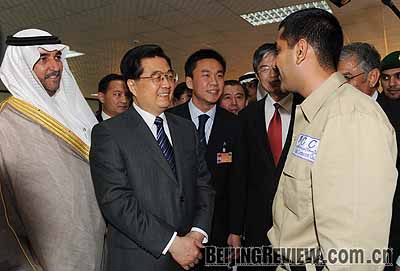| Chinese President Hu Jintao visited Saudi Arabia on February 10-12 before heading to Africa, a trip that helped cement China's bonds with the Middle Eastern country and beyond.
 |
|
WELL DONE: Chinese President Hu Jintao talks to a Saudi Arabian worker at the Chinese-built Riyadh Cement Company on February 11 (RAO AIMIN) | In a meeting with Saudi Arabian King Abdullah bin Abdul-Aziz in Riyadh, the two heads of state vowed to deepen their strategic friendly ties, work together to cope with the global financial crisis and strengthen coordination in international and regional affairs.
Hu told King Abdullah that China values the important role Saudi Arabia has played in safeguarding regional peace and stability and ensuring international energy security, according to a news release from China's Foreign Ministry.
The two countries' bilateral ties have enjoyed all-round and rapid development since they established diplomatic relations in 1990. Saudi Arabia has been China's largest trading partner in West Asia for several years, with two-way trade reaching $41.8 billion in 2008.
Saudi Arabia is China's biggest energy supplier. It exported more than 36 million tons of oil to China last year.
Strengthened cooperation between China and Saudi Arabia is of great significance in the face of the global financial crisis, Hu said. The two countries should collaborate more closely on trade and investment and jointly guard against and respond to financial risks, he added.
Hu and King Abdullah agreed to communicate with each other on reforming the world financial system, and particularly on the London summit of the Group of 20 major economies to be held in April.
Hu also put forward a number of suggestions on advancing the two countries' cooperation, including establishing a high-level consultation mechanism, increasing two-way investment, carrying out more exchanges in the fields of education, sports and tourism, and expanding people-to-people linkages.
The Chinese Government encourages Chinese companies to take part in Saudi Arabia's infrastructure construction to upgrade the two countries' cooperation on project contracting and labor services, he said.
During Hu's visit, China Railway Construction Corp. Ltd. signed a contract with Saudi Arabia on a light rail project in Mecca. The $1.77-billion light rail service is expected to help pilgrims move around more easily in the holy city.
Regional reach
In Riyadh, Hu also met with Abdul Rahman Al-Attiya, Secretary General of the Gulf Cooperation Council (GCC). Both leaders expressed their wish to create a free trade area between China and the GCC as soon as possible.
"The establishment of a China-GCC free trade area is in the fundamental and long-term interests of both sides and will help deepen their mutually beneficial cooperation and achieve common development," Hu said.
China will actively work toward signing the free trade agreement with the GCC at
an early date, Hu said, while calling on both sides to continue energy dialogue and jointly ensure the stability of global energy markets.
China and the GCC launched free trade agreement negotiations in July 2004, and the first round of talks took place in April 2005. The GCC, founded in 1981 and headquartered in Riyadh, is a trade bloc of six Arab states-Bahrain, Kuwait, Oman, Qatar, Saudi Arabia and the United Arab Emirates.
Hu said recent years have witnessed substantial development of China's relations with the GCC and its member countries, as evidenced by their increasing mutual political trust, rapidly growing trade and energy cooperation, and fruitful collaboration in the fields of investment and infrastructure construction.
China has always dealt with its relations with the GCC and its member countries from a strategic perspective, Hu said, adding that he hopes both sides work together closely to improve the group cooperation mechanism.
The GCC is China's eighth largest trading partner.
According to China's Ministry of Commerce, their bilateral trade volume amounted to $79.3 billion in the first 10 months of 2008. | 